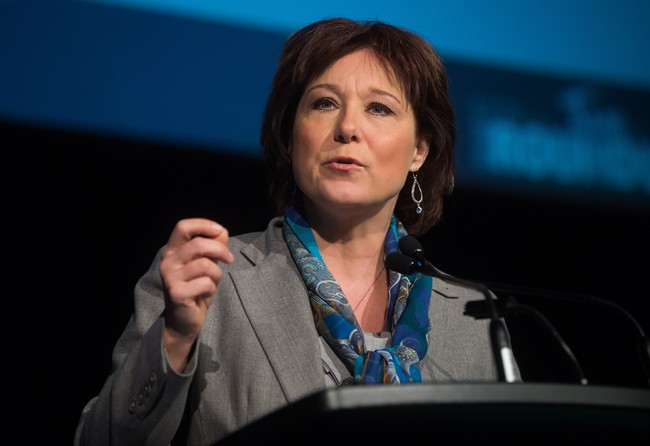BURNABY, B.C. – B.C. Premier Christy Clark insists the possible rejection by a First Nation of a liquefied-natural-gas terminal is nothing more than a bump in the road for a multibillion-dollar pipeline project.

Clark says she believes reaching a negotiated agreement with the 3,700-member Lax Kw’allams First Nation, on whose territory the terminal would be built, is only a matter a time.
Pacific NorthWest LNG wants to transport natural gas from the northeast corner of the province to an export facility on Lelu Island, just south of Prince Rupert.
Band members have been asked to vote on a $1.15 billion offer over 40 years in exchange for their consent for the project.
“It’s always a bit of a bumpy road to get to a negotiated agreement but I think we’ll get there,” said Clark about the possibility of a No vote. “It’s part of the process.”
Lax Kw’allams band member Malcolm Sampson was present for the initial two votes in Port Simpson and Prince Rupert and said both sessions resulted in unanimous rejection from members.
The same outcome is expected for the third and final vote in Vancouver on Tuesday, said Sampson.
The band’s primary concern relates to the project’s potential impact on Flora Bank, an underwater area immediately adjacent Lelu Island where an abundance of eel grass provides vital habitat to maturing salmon in the Skeena watershed.
Pacific NorthWest LNG responded to concerns by proposing to build a 1.7-kilometre suspension bridge that would bypass the sensitive underwater ecosystem. The span would be anchored by a pair of support towers, one planted on the edge of Lelu Island and the other just outside Flora Bank.
A trestle would then carry the pipeline the remainder of the nearly three kilometres to LNG carriers waiting at a deep-water berth.
The company recently submitted additional documents requested by the Department of Fisheries and Oceans related to the updated infrastructure proposal.
Observer and energy lawyer David Austin wonders why the band is set on holding a vote without all the information on the table, calling the move premature.
“The full impact is still unknown,” said Austin, who is with the firm Clark Wilson.
But rejection wouldn’t necessarily scuttle the project.
Lelu Island is Crown land managed by the Prince Rupert Port Authority, which means the province technically has the authority to push ahead without support from the Lax Kw’allams.
Even if the First Nation band proves it has aboriginal title — which would require proving it has had exclusive occupancy of the territory — Supreme Court precedent gives the province the right to override that claim.
“From a legal perspective it would be very complicated to proceed with the LNG terminal without (First Nation) support,” said Austin. “But if the circumstances were right not impossible.”
The length of time required to sort out the legal uncertainty resulting from a lack of First Nations support might encourage LNG developers to go elsewhere with their investments, he added.
The B.C. government said it has reached 54 pipeline-benefits agreements with 28 First Nations across the province. Of the 59 First Nations along the natural-gas pipeline ending at Lelu Island only five have publicly announced signing agreements with the government.
— Follow @gwomand on Twitter



Comments